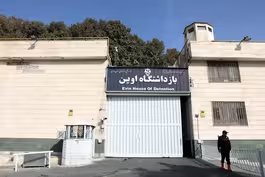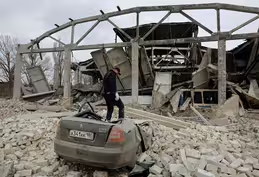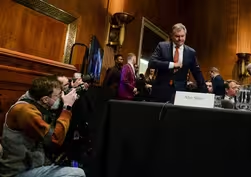
White House makes push to eradicate hepatitis C
Clip: 3/9/2023 | 8m 12sVideo has Closed Captions
White House makes push to eradicate hepatitis C
Part of President Biden's budget focuses on attacking hepatitis C, a disease that's almost completely curable with drugs. Left untreated, it can lead to chronic illness and even death. But roughly 2.4 million Americans still live with it amid barriers over cost and access. Dr. Francis Collins, former National Institutes of Health director and now an adviser to Biden, joins Amna Nawaz to discuss.
Problems playing video? | Closed Captioning Feedback
Problems playing video? | Closed Captioning Feedback
Major corporate funding for the PBS News Hour is provided by BDO, BNSF, Consumer Cellular, American Cruise Lines, and Raymond James. Funding for the PBS NewsHour Weekend is provided by...

White House makes push to eradicate hepatitis C
Clip: 3/9/2023 | 8m 12sVideo has Closed Captions
Part of President Biden's budget focuses on attacking hepatitis C, a disease that's almost completely curable with drugs. Left untreated, it can lead to chronic illness and even death. But roughly 2.4 million Americans still live with it amid barriers over cost and access. Dr. Francis Collins, former National Institutes of Health director and now an adviser to Biden, joins Amna Nawaz to discuss.
Problems playing video? | Closed Captioning Feedback
How to Watch PBS News Hour
PBS News Hour is available to stream on pbs.org and the free PBS App, available on iPhone, Apple TV, Android TV, Android smartphones, Amazon Fire TV, Amazon Fire Tablet, Roku, Samsung Smart TV, and Vizio.
Providing Support for PBS.org
Learn Moreabout PBS online sponsorshipAMNA NAWAZ: One part of President Biden's budget focuses on attacking a disease that's almost completely curable with drugs, hepatitis C. Roughly 2.4 million Americans still have hepatitis C, a viral liver infection.
Untreated, it can lead to chronic illness, liver cancer and death.
But drugs made available since 2013 cure hep C in 95 percent of patients, yet all kinds of barriers remain over cost and access.
The president is asking for $5 billion to expand rapid testing, access and treatment.
Dr. Francis Collins, the former director of the NIH, is now a special projects adviser to the president on this.
And I spoke to him earlier this week before the budget was released.
Dr. Collins, welcome back to the "NewsHour."
DR. FRANCIS COLLINS, Former Director, National Institutes of Health: Glad to be here with you.
AMNA NAWAZ: So, let's set the table a little bit, because we don't often get to talk about hepatitis C, but it does disproportionately affect certain populations.
So, who is most at risk, and why?
DR. FRANCIS COLLINS: Hepatitis C is transmitted through the blood.
And so there are Baby Boomers who got blood trends fusions back before we knew how to test for this virus, and they also now are infected, and many of them don't know it.
But, more recently, it's oftentimes people who've shared needles, or a tattoo needle can be also the way this passes.
And it can be passed from mother to child.
So, it's a mix of folks, many of them, though, in marginalized communities who don't at the present time have great access to health care, which is one of the reasons we need a program if we're going to actually take advantage of this historic moment.
We can cure these people.
AMNA NAWAZ: When you talk about testing, I noted there you said most people don't know they're infected.
Something like 40 percent of people do not know that they're infected.
Why the barriers to testing?
DR. FRANCIS COLLINS: Well, it's complicated and expensive, and the logistics aren't great.
Right now, the test requires going in one time to see if you have antibodies against the virus.
That says you have seen it at some point.
But some people cure themselves.
Then you have to come back for the test.
Do you have the virus now?
That's an RNA test.
And that usually takes a while for the results to come back.
And then you got to come back the third time and start on the pills.
And most people who are in difficult circumstances have trouble with three visits.
And our medical care system doesn't do so well either at making that easy.
And, oftentimes, there's barriers.
You have to see a specialist.
I don't think, in this circumstance, a specialist is needed, but that's the way a lot of the systems are.
So there are a lot of things getting in the way of what should be a much easier process.
If we had a test -- and we're going to make this happen - - that's point of care, that is, you come in, you have a simple finger stick, it says, oh, you have active infection with hepatitis C, 30 minutes later, here's your pills, you're starting on your cure today.
AMNA NAWAZ: In a single visit.
DR. FRANCIS COLLINS: One visit.
AMNA NAWAZ: The cure you mentioned, there is a cure.
There is.
AMNA NAWAZ: These in most cases are curable.
Is cost one of the reasons the cure has been out of reach for most people?
DR. FRANCIS COLLINS: That's a big part of it, but not the whole thing.
Yes, the cost has been quite high.
The cure has been available for about seven or eight years.
It's one of the most major dramatic achievements of medical research for a couple of decades to have this direct-acting antiviral medicine.
It knocks out the virus, but it doesn't knock out anything in the host, one pill a day, 12 weeks, 95 to 97 percent cure, and virtually no side effects.
I mean, it is almost miraculous for a disease that has taken so many lives.
But it was initially priced very high, about $90,000 per patient.
That's still pretty high at about $24,000 per patient.
And if you're trying to run a Medicaid clinic or a clinic for people who have no insurance, or people in prison, where the incidence is pretty high because of the interaction with the drug trade, you just can't figure out how to pay for it.
AMNA NAWAZ: I want to ask you about those prisons, though.
You mentioned overcoming the barriers to testing and to getting treatment into more people's hands .There was this investigation that looked into the prison system and found state governments were just failing to care for people in their custody, not testing them, because they didn't want to have to treat them, in some cases, just refusing to treat people who they knew were infected.
How do you overcome those barriers?
DR. FRANCIS COLLINS: Talking to a lot of the people who run those prisons, they feel terrible about this, but they can't afford right now in the current system to actually offer the treatment.
And so they basically try not to even test, because, if they have tested and they're not doing anything, that almost makes you feel worse.
They're looking for a way forward.
That's what this proposal is from the Biden administration that is being rolled out now, a five-year plan to make the drug available essentially for free to prisons, to Medicaid clinics, to the community health centers that deal with the uninsured, to people on the reservation, to people in opioid treatment centers.
But we have to come up with a way to make that happen, which is a pretty creative model that some would call a subscription model.
I can tell you more about it.
I think it's the way to solve this.
And it's already been successfully done in a couple of states.
AMNA NAWAZ: So, it's a five-year plan based on a sort of subscription model, as you describe it.
How does that work in the community level?
DR. FRANCIS COLLINS: Well, Louisiana piloted this.
The idea here is kind of like Netflix.
In fact, people refer to this as the Netflix model.
When you sign up for Netflix -- I'm not advertising for them -- you pay one payment, and then you can binge all you want with whatever they have to offer.
So the idea is, you pay the drug company a lump sum, which has to be negotiated.
And there are two companies, so there will be some competition.
And then they have to agree to make the drug available for free from that point on to people in prison, people in the community health centers who are uninsured, people on Medicaid, people on the reservation.
And you end up driving the cost per patient down, as they did in Louisiana, dramatically.
And everybody wins, because the company, right now, they're not making any money selling these drugs to those groups because nobody can afford it.
They come out OK, but, more importantly, all those people now get treatment that can be afforded.
It'll work.
AMNA NAWAZ: You have had successful pilot programs.
You're building -- you want to build off of that.
But you mentioned it's a five-year plan.
It's also a $5 billion plan, at a time when there is a brewing debate over spending cuts in Congress.
How likely are they to back this?
DR. FRANCIS COLLINS: Well, I hope people will look at it carefully and see that, although you do have to pay something up front to do the testing and deliver the drugs and the health care, if you look downstream, in terms of the dollars you save from people who now will not need a liver transplant, will not need that treatment for liver cancer -- and this is the most common cause of liver cancer.
Over the course of 15 or 20 years, you more than pay -- you more than make up for what you had to pay.
This is actually deficit reduction.
You just have to scale it out over time.
Even in 10 years, that starts to kick in.
AMNA NAWAZ: I hope you don't mind my asked me, Dr. Collins.
You do come to this work with your own personal experience in forming it.
Would you mind telling us about that?
DR. FRANCIS COLLINS: Oh, my brother-in-law, Rick (ph), just a wonderful human being who is a friend to everybody, a wonderful husband to his wife, he had hepatitis C. Never was quite clear how he got it.
And he developed liver failure, ended up having to have a liver transplant, which was really hard to get.
Transplants are so hard now.
And then he turned out to have liver cancer, and he died, a terribly awful, difficult death.
This was just a couple of years before the cure became available.
I don't want anybody to go through what Rick went through or what Rick's family went through, including me, my wife, his wife, that it's totally preventable now.
If we're a country that cares about all of our people, even those who've had rough times, how can we look at this and then walk away?
AMNA NAWAZ: Dr. Francis Collins, special project adviser for President Biden, thank you very much for being here.
DR. FRANCIS COLLINS: Glad to be with you.
Families try to secure freedom of Americans detained in Iran
Video has Closed Captions
Clip: 3/9/2023 | 8m 59s | Families of Americans detained in Iran press for their release (8m 59s)
How to be a smarter shopper amid rising grocery bills
Video has Closed Captions
Clip: 3/9/2023 | 3m 51s | How to be a smarter shopper amid rising grocery bills (3m 51s)
News Wrap: Russia launches large-scale attack across Ukraine
Video has Closed Captions
Clip: 3/9/2023 | 5m 25s | News Wrap: Russia launches large-scale attack across Ukraine (5m 25s)
Norfolk Southern CEO faces Senate over toxic Ohio derailment
Video has Closed Captions
Clip: 3/9/2023 | 10m 6s | Norfolk Southern CEO faces Senate scrutiny for toxic Ohio train derailment (10m 6s)
Unpacking Biden's newly unveiled $6.9 trillion budget plan
Video has Closed Captions
Clip: 3/9/2023 | 7m 1s | Unpacking Biden's budget plan and its chances of becoming law with a divided Congress (7m 1s)
Providing Support for PBS.org
Learn Moreabout PBS online sponsorship
- News and Public Affairs

FRONTLINE is investigative journalism that questions, explains and changes our world.

- News and Public Affairs

Amanpour and Company features conversations with leaders and decision makers.












Support for PBS provided by:
Major corporate funding for the PBS News Hour is provided by BDO, BNSF, Consumer Cellular, American Cruise Lines, and Raymond James. Funding for the PBS NewsHour Weekend is provided by...




